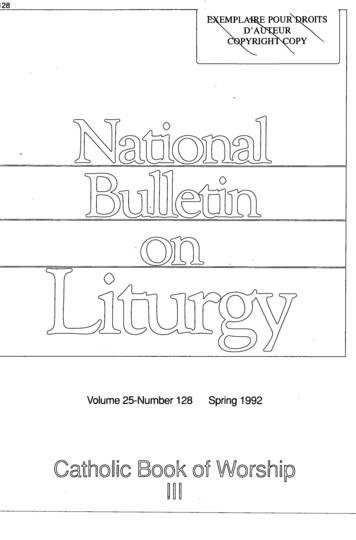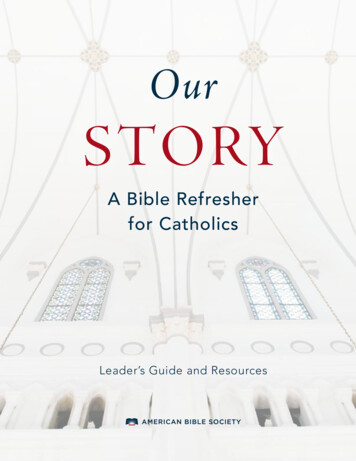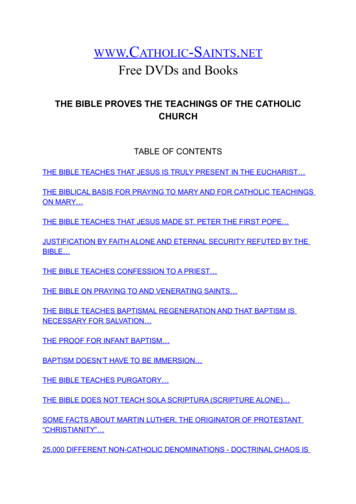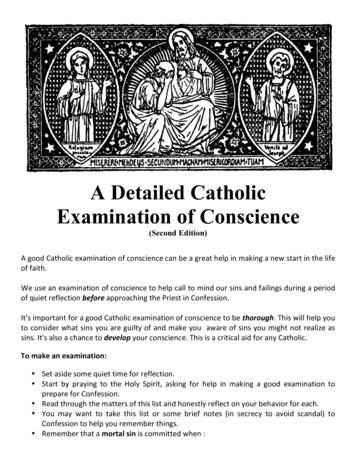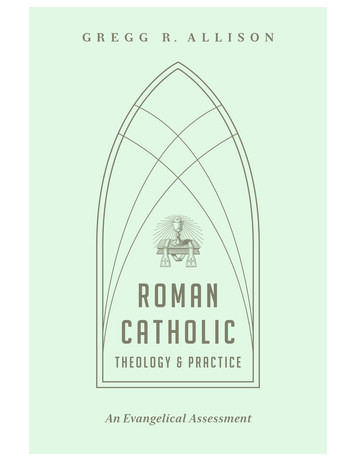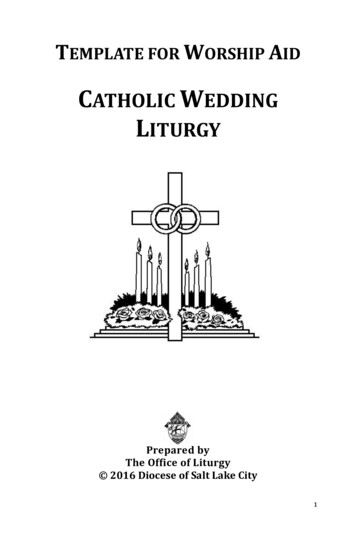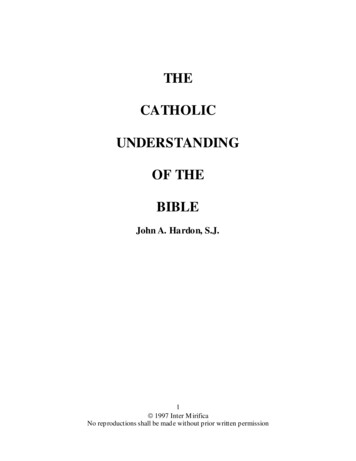
Transcription
THECATHOLICUNDERSTANDINGOF THEBIBLEJohn A. Hardon, S.J.1 1997 Inter M irificaNo reproductions shall be made without prior written permission
THE TABLE OF CONTENTSINTRODUCTIONHistoric ChristianityPART ONE – THE BIBLECHAPTER I – THE BIBLE AS THE WORD OF GODRevelationNatural RevelationSupernatural RevelationSacred TraditionSacred ScriptureCHAPTER II – INSPIRATION IN THE BIBLETestimony of the ScripturesChurch’s TeachingHow Is the Bible Inspired?ImplicationsInerrancyNo ContradictionsOriginal TextReverence for the Word of GodCHAPTER III – THE CANON OF THE BIBLEThe Old and New TestamentsOld TestamentsPalestinian and Alexandrian CanonNew TestamentCHAPTER IV – HOW T HE OLD AND NEW TESTAMENTS ARE tionCompletion2 1997 Inter M irificaNo reproductions shall be made without prior written permission
DevelopmentDevelopment of DoctrineDevelopment of RevelationIncarnationCHAPTER V – THE INTERPRET ATION OF THE BIBLEScience of HermeneuticsBasic MeaningsThe Literal SenseThe Mystical SenseTeaching of Second VaticanThe Meaning of the Human WritersThe Intention of the Holy SpiritPART TWO – THE BOOKS OF THE BIBLECHAPTER VI – THE OLD TESTAMENTSt. MatthewSt. MarkSt. LukeSt. John’s GospelCHAPTER VII – THE NEW TESTAMENTThe GospelsSt. MatthewSt. MarkSt. LukeSt. JohnActs of the ApostlesLetters of St. PaulThe Catholic EpistlesJamesPeterJohnJudeThe ApocalypsePART THREE – MASTER THEMES OF THE BIBLE3 1997 Inter M irificaNo reproductions shall be made without prior written permission
CHAPTER VIII – OUR KNOWLEDGE OF GODNatural KnowledgeRevealed KnowledgeCHAPTER IX – OUR LOVE OF GODOld TestamentNew TestamentCHAPTER X – MESSIANISMConcept of the MessiahMessianic DevelopmentPatriarchal PeriodRoyal MessianismThe Exile and AfterThree-Fold AnnointingPART FOUR – SPIRITUAL TEACHING OF THE GOSPELSCHAPTER XI – CHRISTIANITY IS HISTORICALThe Gospels Are FactualThe Gospels Are Not ImaginaryCHAPTER XII – THE WORD OF GODThe Word In HimselfThe Mission of the WordCHAPTER XIII – THE ANNUNCIATION AND INCARNATIONCHAPTER XIV – THE VISITATIONMediatrix of GraceHail MaryFull of GraceThe Lord Is With TheeBlessed Art Thou Among WomenAnd Blessed Is the Fruit of Thy Womb, JesusHoly MaryMother of God4 1997 Inter M irificaNo reproductions shall be made without prior written permission
Pray For Us Sinners Now and At the Hour of Our DeathCHAPTER XV – MARY MAGNIFIES THE LORDCHAPTER XVI – THE LESSONS OF BET HLEHEMPolitical Power and Jesus ChristThe Poverty of the Incarnate GodThe First Message of the Angel to the ShepherdsThe Angelic Promise of PeaceThe Shepherds Came and BelievedThe Shepherds As First ApostlesThe Heart of MaryPrayerCHAPTER XVII – PRESENTATION AND PURIFICATIONPurification of the Blessed Virgin MaryPresentation of JesusThe Nunc DimittisThe Prophetess AnnaCHAPTER XVIII – THE VISITATION OF THE MAGIThe Magi Symbolize the GentilesHerod Symbolizes the StateCHAPTER XIX – JESUS FOUND IN THE TEMPLEGod Tries Those He LovesMary’s Lesson to All of UsCHAPTER XX – BAPTISM OF JESUSJohn the Baptist Announces JesusChrist’s Baptism and HumilityAnnouncement of Christ’s DivinityCHAPTER XXI – TEMPTATION OF CHRIST BY THE DEVILWhy was Christ Tempted?Temptations of ChristFirst TemptationSecond Temptation5 1997 Inter M irificaNo reproductions shall be made without prior written permission
Third TemptationINTRODUCTIONIt must seem strange to write a book on The Catholic Understanding of the Bible.But, it will not be strange once we realize two things: that every major religion inthe world has what it calls its Bible, and that among Christians, the Bible isvariously understood.Not to speak of the Catholic understanding of the Bible would be confusing, to saythe least, and even misleading. The Bible is not just the Bible. It is the foundationfor Christianity. Everything depends on three things: what books form thecontents of the Bible, how the Bible is translated, and most importantly, how theBible is interpreted.All the religions have their own scriptures. The Hindus have the Vedas, Buddhiststhe Tipitaka, Taoists their Tao Teh Ching, and Moslems the Koran. Just whatconstitutes a sacred writing and how the scriptures are to be understood are sovaried and divergent as to defy scientific analysis. Much of the difficulty that aChristian faces in studying other systems of faith arises from this basic difference-between the Bible of Christianity (and Judaism) and the equivalent sacred literatureof other living religions. A standard definition of the Bible is to call it apublication that is preeminent especially in authoritativeness.Before we go any further, it will be useful to make an overview of how the modernworld, more specifically our twentieth and twenty-first centuries, look at the Bible.Without this perspective, we could be using the same words that are currently envogue when speaking and writing about the Bible, but our contemporaries wouldnot know what we are talking about. Not only has a new biblical vocabulary comeinto existence, but a totally new perspective of the scriptures has been born.6 1997 Inter M irificaNo reproductions shall be made without prior written permission
HISTORIC CHRISTIANI TYFrom the dawn of the Christian religion, the followers of Christ have consideredthe Bible a special communication of God, in which the prophets of the OldTestament and Jesus of Nazareth in the New, revealed to the chosen people thesecrets of divine wisdom and the means of salvation for mankind. The ChristianScriptures are not just an important piece of religious writing; nor, as in Islam, onlybasic guidelines of moral conduct. They are believed to have been co-authored byGod, who gave the inspiration and direction to the hagiographer whose faculties ofmind, will, and execution were mystically directed by the Holy Spirit, yet withoutprejudice to the native qualities of the human agent.One result of this uniqueness has been the concern of the Church to trace the dataand text of the Bible to its earliest possible sources. That is why biblicalarchaeology and papyrology are distinctively Christian sciences. Since the eventsdescribed in the Bible and the narratives it contains pertain to certain periods ofhistory, it is imperative to know their historical context. We must therefore knowthe language and geography, culture and biography, and even economics andbiology. Why? Because this knowledge is an invaluable means to betterunderstand the sacred text and come closer to its original and authentic wording.Nor is that all. Christians assume that to have the biblical text is one thing, evenwhen its authenticity is assured. However, to know the true meaning of the Bibleis something else. In every age since apostolic times, Christians have wrestledover the interpretation of the Bible, and wars have been fought over thedifferences. The science of biblical hermeneutics is also very Christian.Hermeneutics is the interpretation of Sacred Scripture and inquiring into its truemeaning. It defines the laws that biblical scholars are to follow in order todetermine and explain the sense of the revealed word of God. So distinctive ishermeneutics that Oriental specialists in the Hindu tradition, for example, arebaffled by what to them seems such wasted effort: whether Jesus’ words, “I andthe Father are one,” should be taken literally or symbolically. Hinduism allows foravatars, or incarnations of the deity; and advaita, or the identity of God and theuniverse. It makes no claim to possess objective religious truths and even thesearch is considered illusory. Thus even the great Mahatma Gandhi never becamea Christian because, as he said, the human mind can never know the truth. Life isthe constant search for the truth.7 1997 Inter M irificaNo reproductions shall be made without prior written permission
This volume is intended as a textbook for a course on the Catholic understandingof the Bible. Its purpose therefore is clearly academic. It will deal with the basicsof biblical study. As we go along, references will be made to authors and sourcesfor a more scientific and advanced grasp of Sacred Scripture.It is assumed that those who use this book will do so with a copy of the Biblealways at their disposal. It is further assumed that those who take this course areinterested in more than merely learning about the Bible. This course is intendedespecially for those who want to use the Bible as a means of teaching others aboutthe Catholic faith.This is especially important in our day. In so many countries of the Westernworld, the culture has been deeply influenced by Protestantism. Consequently,many Catholics have come to identify God’s revealed truth with the Bible. Theypractically assume that everything which God has manifested about Himself andour responsibilities in doing His will are contained in the scriptures. They furtherassume that each person is somehow divinely enlightened to interpret the Biblewithout dependence on the magisterium of the Catholic Church.As though all of this was not enough, Catholics are now literally flooded with abewildering variety of biblical translations and, to change the figure of speech,deluged with so many biblical commentaries that they wonder, “What are we tobelieve?”That is why a book of the Catholic understanding of the Bible is not only useful,but necessary. Over the centuries, wars have been fought over the SacredScriptures. It is imperative that the desperate need for unity in our divided societyshould be promoted by the revealed word of God as found in Holy Writ. AsCatholics, we have the duty to advance the cause of re-uniting a dismemberedworld by our clear and deep understanding of biblical revelation.8 1997 Inter M irificaNo reproductions shall be made without prior written permission
PART ONE – THE BIBLEChapter ITHE BIBLE AS THE WORD OF GODThe place to begin any course for understanding the Bible is to see how the Bibleis the revealed word of God. This is not so obvious as we may at first suppose.People use the expression “revelation” and “word of God” in so many differentways that it is not always clear what these persons mean.Our first step, therefore, towards getting some grasp of what the Bible is all aboutis to see how the Sacred Scriptures are part of God’s revelation to the humanfamily. In order to see this as clearly as possible, we should look at the meaning ofrevelation from a variety of angles.We will ask ourselves several questions in sequence and then briefly answer eachone as we go along:*****What is revelation?What is natural revelation?What is supernatural revelation?What is unwritten supernatural revelation (or Sacred Tradition)?What is written supernatural revelation (or Sacred Scripture)?If it seems strange to ask so many different questions, the reason is that weunderstand something only as clearly as we understand it distinctively. Clearnessof thought means being able to distinguish one idea from another. Failure todistinguish Sacred Scripture from other forms of God’s communication to thehuman race is the bedrock of so much confusion among otherwise sincerebelievers in Judaeo-Christianity.REVELATIONWhen we say that the Bible is revelation we obviously mean that something is9 1997 Inter M irificaNo reproductions shall be made without prior written permission
revealed or disclosed by someone. Thus, we speak of revealing a secret or that oneperson revealed himself to another person, or that something never known beforesuddenly becomes known to us and we call it a “revelation”.All these uses of the word “revelation” have one thing in common. What waspreviously unknown, or not so well known, becomes either known or betterknown. The word itself comes from two Latin words, re, which means to removeor take away, and velum, which means a veil or covering. Consequently to revealsomething is to unveil or uncover what had previously been more or less hiddenfrom the human mind.Moreover, revelation implies that one person or individual intelligent being isrevealing what is on his mind to someone else who then receives the revelation.When I reveal my identity to a previous stranger, I tell that person who I am orsomething about myself, which he or she did not know before I made thedisclosure. Every revelation, then, is a personal communication from oneindividual who does the revealing to another individual to whom the revealermanifests himself.Self-revelation, in fact, is the foundation of friendship. And the degree to whichone person is willing to reveal himself to someone else is the measure of theirfriendship. This is almost a platitude. Since friendship is mutual love, there can beno true love between two people unless they first know one another. The humanwill is a blind faculty. It can choose only what the mind tells the will is good. Thewill can only love, which is sustained choice, what the mind has told the will islovable.One more observation. Although the will is blind and must be informed by themind, the will has the power to command the mind to seek to know. In otherwords, the mind and will are mutually dependent on each other. The mind mustshow the will what should be chosen and loved. But the will must command themind to obtain the knowledge which is then offered to the will for choosing andloving.In terms of friendship, therefore, two persons will not know one another unlesseach is willing to manifest himself or herself to the other.Immediately we see that just as human beings reveal themselves to other human10 1997 Inter M irificaNo reproductions shall be made without prior written permission
beings, so God reveals Himself to us. Indeed, God’s self-disclosure to the humanrace is the basis for every other form of self discourse among ourselves. UnlessGod had first decided to give us a mind with which to know and given usknowledge to share with others, there would be no speech among human beings orfor that matter, no social communication or society in the world today.NATURAL REVELATIONThere are two ways that God has revealed Himself to the human family. One wayis said to be natural and the other supernatural.What is God’s natural revelation? It is ordinary revelation. It is the way God tellsus about Himself through the ordinary channels that we all have at our disposal.What are these channels? They are the power of thinking that every human beinghas on reaching what we call the age of reason. Secondly, it is the world ofcreatures that manifest the goodness and greatness of God who created this worldin which we live.Both the Old and New Testaments verify man’s natural capacity for knowing Godfrom the world of creation in which he lives. In the Old Testament, the Book ofWisdom devotes no less than nine verses to its criticism of those who do not usetheir reason to arrive at the knowledge of the one true God:Yes, naturally stupid are all men who have not known God and who,from the good things that are seen, have not been able to discover Himwho-is, or, by studying the works, have failed to recognize the Artificer.Fire however, or wind, or the swift air, the sphere of the stars, impetuouswater, heaven’s lamps, are what they have held to be the gods whogovern the world.If, charmed by their beauty, they have taken things for gods, let themknow how much the Lord of those excels them, since the very Author ofbeauty has created them. And if they have been impressed by theirpower and energy let them deduce from these how much mightier is Hethat has formed them, since through the grandeur and beauty of thecreatures we may, by analogy, contemplate their Author.11 1997 Inter M irificaNo reproductions shall be made without prior written permission
Small blame, however, attaches to these men, for perhaps they only goastray in their search for God and their eagerness to find Him; livingamong His works, they strive to comprehend them and fall victim toappearances, seeing so much beauty. Even so, they are not to beexcused; if they are capable of acquiring enough knowledge to be able toinvestigate the world, how have they been so slow to find the Master?(Ws 13:1-9)St. Paul is even more clear in his denunciation of those who do not use their naturalreason to arrive at the knowledge of the one true God. The Apostle to the Gentilesinsists on man’s responsibility to praise God, arising from his ability to know Godfrom the creatures He has made. He told the recent converts to Christianity thatsome of their contemporaries were keeping “the truth imprisoned in theirwickedness.” How so? Because “what can be known about God is perfectly plainto them since God Himself has made it plain. Ever since God created the world,His everlasting power and deity – however invisible – have been there for the mindto see in the things He has made. That is why such people are without excuse.They knew God and yet refused to honor Him as God or to thank Him. Instead,they made nonsense out of logic and their empty minds were darkened. The morethey called themselves philosophers, the more stupid they grew, until theyexchanged the glory of the immortal God for a worthless imitation” (Rom 1:1823).As St. Augustine was later to explain in his Confessions, there is a grimrecompense for man’s refusal to acknowledge God as his master. God allows aman’s spirit to lose mastery over his own body. Lust is the normal consequence ofpride.Moreover, each one of us has a deep down desire for happiness that is neverperfectly satisfied here on earth. Each of us also realizes that this imperfecthappiness depends on how well we behave, that there is no real joy in selfishnessand no peace of heart in cruelty. These too are part of God’s natural revelation,telling through reason how He wants us to use the creatures that enter our life. Hetells us the price we must pay to obtain peace of soul here on earth and thecomplete fulfillment of our desires that we instinctively look forward to beyond thegrave.12 1997 Inter M irificaNo reproductions shall be made without prior written permission
SUPERNATURAL REVELATIONNatural revelation was not all that God has disclosed to the human race. Therewould be no Sacred Scripture, and no Christianity, unless God had revealedHimself beyond what we can know from our own reason and the world of nature inwhich we live.We begin to begin to understand Sacred Scripture only if we realize that God hasgiven us a supernatural revelation. Supernatural revelation begins where naturalrevelation ends. It is in the character of a grace from God, who has decided tocommunicate Himself in a manner that far exceeds His manifestation throughnature.There are two levels of this supernatural revelation, as capsulized by the author ofHebrews: “At various times in the past and in various ways, God spoke to ourancestors through the prophets, but in our own time, the last days, He has spokento us through His Son, the Son that He has appointed to inherit everything andthrough whom He made everything there is. He is the radiant light of God’s glory,and the perfect copy of His nature” (Heb 1:1-2).The difference between these two kinds of supernatural communication lies in thefact that, before Christ, God spoke indeed, but still indirectly through the prophets,who were inspired to tell others what Yahweh had told them. In the person ofChrist, however, it was no longer God speaking merely through human seerschosen by Him; it was God Himself speaking as man to His fellow members of thehuman race. We might say that revelation is said to be supernatural when Godtells us about Himself immediately, somewhat as we do when we talk to anotherperson.Even as we can talk to people, so God can dispense with our use of reason andreflection on the world of nature, and directly enlighten our minds about what Hewants us to know. When He does this, we call it a supernatural way of revealingHimself to us.Immediately we see that divine communication of truth can be supernatural in twoways. It is always supernatural in the manner of communication just described.But it can also be supernatural when its content is beyond the capacity of human13 1997 Inter M irificaNo reproductions shall be made without prior written permission
nature to attain.Thus, revelation may be supernatural twice over: In the subjective powers bywhich a person acquires what God desires to reveal; or/and in its very essence,when God discloses such mysteries as the Trinity and the Incarnation. In the firstcase, revelation is supernatural in the manner that God chooses to communicateHimself to human beings. It partakes of a miraculous enlightenment of the seer,who then serves as a divine legate for sharing with others what God hassupernaturally communicated to that person. In every case, however, theacceptance of revelation requires the influx of supernatural grace to enable aperson to believe.When God reveals Himself supernaturally in the content of His revelation, He istelling us about His own intimate, personal life as God; that He is an eternalSociety of three persons, in one God; and that He intends to share this divine lifewith us, by having us participate in His own perfect happiness in the Trinity, byknowing and loving Him with unspeakable intimacy for all eternity.SACRED TRADI TIONHaving decided to reveal Himself, not only naturally but supernaturally, God mighthave done so personally to each individual human being.Much as each of us arrives at some natural knowledge of God by our ownreasoning powers, so God might have separately revealed Himself supernaturallyto each and every member of the human family.But He chose not to do so. Instead, He chose certain persons since the dawn ofhistory to whom He specially revealed Himself, and through whom, then, Hewanted the rest of mankind to believe in Him.This is perfectly understandable. In this way, God would ensure the rise of abelieving community, who would be bound together by the common faith inaccepting revelation made to a chosen prophet or spokesman of God.Some of these prophets, or divine-messengers, would be instructed by God to sharetheir revelation with others without being also directed to put this revelation in14 1997 Inter M irificaNo reproductions shall be made without prior written permission
writing. What they have left us we now call Sacred Tradition. Others weredirected by God to put the revealed message in writing. We call this SacredScripture.Before going any further, it might be useful to clarify three different senses inwhich the single word “tradition” is used in Catholic theology.* Sacred Tradition, as we have explained, is supernatural revelation whichwas completed about the year 100 A. D. with the death of the last of the apostles,St. John the Evangelist. It is supernatural revelation that was indeed inspired byGod, but not originally inspired in written form. Sacred Scripture is alsosupernatural revelation, and also completed by the end of the apostolic age. But itwas originally inspired by the Holy Spirit to be put into writing by persons whomwe call the human authors of the Bible.* Tradition is an accepted term for the Church’s teaching authority,otherwise known as the magisterium. The magisterium is the Church’s right toinstruct the world about the things of God. It is vested in the bishops, assuccessors of the apostles, under the Roman Pontiff, as successor of St. Peter. It isalso vested in the pope, as the Vicar of Christ, and visible head of the CatholicChurch. Just in passing, we should note that the doctrine which the Church’smagisterium teaches has been developing over the centuries since apostolic times.But there has been no development, in the sense of accretion, of divine revelationwhose content remains constant until the dawn of eternity. Development ofdoctrine is the subjective growth in the Church’s understanding of God’s revealedtruth; her growth in more clearly grasping what God has once and for all revealed;her certitude in never doubting this revealed truth; her practical application ofdivine revelation according to the changing circumstances in history and differentcultures.* Ecclesiastical traditions are the variable customs, practices, rituals andways in which the Church accommodates herself to the times and circumstances ofdifferent ages and different peoples. These traditions will consequently modify inliving out the unchangeable faith and morality of Catholic Christianity.There is nothing subtle about what Sacred Tradition means. It is all that Godwanted to be told to mankind through inspired persons whose lives thus becamethe source of instruction and motivation for all future generations. It is called15 1997 Inter M irificaNo reproductions shall be made without prior written permission
Tradition, because the message of salvation from God through these saintly seerswas passed on to us (Latin tradere, to hand on) orally. It is called Sacred, becausethe content of the message was the word of God, and therefore something holy.We say this form of revelation was passed on orally. That is true, although it is notonly what the prophets said, but what they did and how they lived that often spokelouder than the words they gave their contemporaries, and through thesecontemporaries to all future believers, even until the end of time.SACRED SCRIPTUREWe are now in a better position to see how Sacred Scripture is a form of revelation,but different from Sacred Tradition. Sacred Scripture is not only different butdistinct and, in fact, unique.Like Tradition, Scripture is Sacred because it comes from the all-holy God. It isSacred because it is meant to sanctify all who accept it on faith and faithfully liveup to its sometimes heavy demands. It is Sacred because its purpose is to lead thehuman race back to God who first created the human race out of nothing. It isfinally Sacred because by their humble submission to what the Bible teaches, itforms believers on earth into the People of God and prepares them for citizenshipin the heavenly Jerusalem for which they were made.But, unlike Tradition, the Bible is Scripture, because it was God’s intention fromthe beginning to have it set down in written form. The Latin verb scribere means“to write,” as the Latin noun scriptum means “that which is written.”One of the marvels of God’s providence is that the art of phonetic writing, as weknow it today, was invented not long before the Bible began to be composed.Equally marvelous is the fact that the phonetic alphabet was discovered in thepresent Near East, among the peoples whom we now designate as Semitic. Andone more wonder: Much of mankind, even in our day, is largely illiterate, as itcertainly was during the centuries when the Bible was being written. Yet Godwanted His revealed word to be put in writing. Why? To provide all future ageswith a definite, stable, and essentially unchangeable treasury of revealed truth.There is an ancient Latin proverb which says, Scripta manent, verba volant, that is,16 1997 Inter M irificaNo reproductions shall be made without prior written permission
“Things that are written remain, what is spoken flies away.”Before we leave the present subject of “The Bible as revelation,” let us make surewe know what kind of revelation this is.It is supernatural revelation, as was explained before. But more than that, the Bible(along with Sacred Tradition) is public and not merely private revelation. Thismeans that what God revealed in the Scriptures is intended for all mankind, and notjust for a single person or group of people. It is moreover intended for all placesand all times, and not only for certain parts of the world or up to a certain age orstage of human history.The Bible could not be public, in the sense here described, unless its message ofsalvation was completed at a point in past time, which the Church commonly sayswas at the end of the age of the apostles. As the last of the apostles who followedChrist passed into eternity, biblical revelation (along with Sacred Tradition) cameto an end. It was finished. There is only one Incarnation and one Son of God, whobecame the Son of Mary, to redeem us from sin. There is only one substantialdeposit of faith, based on the revelation which began with the first Adam, and wascompleted with the Second Adam, who is Jesus Christ.However, the capstone to understanding how the Bible (like Sacred Tradition) ispublic, lies deeper still. No doubt the ways of God are mysterious, and there is nolimit to the power of His self-communication. Over the centuries since the time ofChrist, there have been saintly men and women whose spiritual experiences wereforms of supernatural revelation from the Lord. Men like Francis of Assisi andJohn of the Cross, and women like Catherine of Sienna and Theresa of Avila, wereonly peaks in a range of mysticism that the Church has recognized as genuine andrecommended to the faithful for acceptance and direction.Yet, while unquestionably supernatural, these revelations given to the saints aremerely private, no matter how widely known or respected they may be. How so?Unlike the public revelation of the Bible, they are not necessary for the salvationand sanctification of the human race. They are useful, but not essential. They arehelpful, but not fundamental.Biblical revelation is public because it is indispensable for everyone, including thesaints. Without the Gospel of St. John, there would be no John of the Cross, and17 1997 Inter M irificaNo reproductions shall be made without prior written permission
without the epistles of St. Paul, there would be no Margaret Mary, to whom Christrevealed the secrets of His divine Heart.18 1997 Inter M irificaNo reproductions shall be made without prior written permission
Chapter IIINSPIRATION IN THE BIBLEThe English words “inspiration” and “inspired” have such a variety of meaningsthat we had better look at them more closely before going on to explain how theBible is the inspired word of God.We speak of the inspiration of g
Not to speak of the Catholic understanding of the Bible would be confusing, to say the least, and even misleading. The Bible is not just the Bible. It is the foundation for Christianity. Everything depends on three things: what books form the contents of the Bible, how the Bible is translated, and most im
